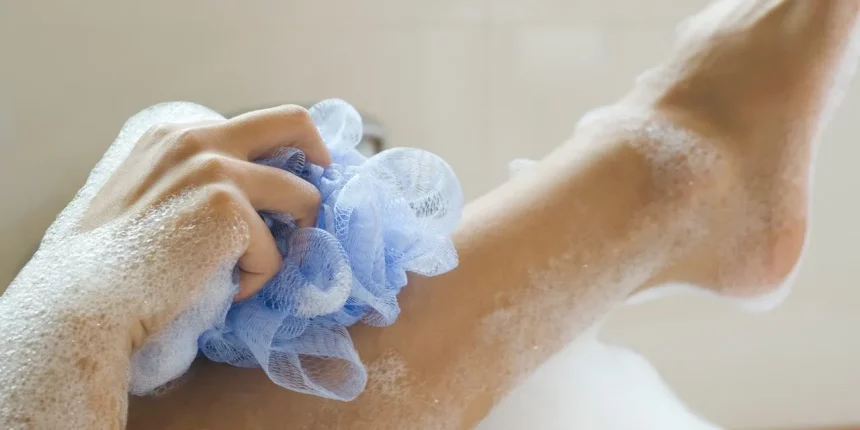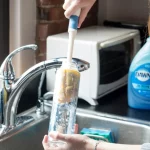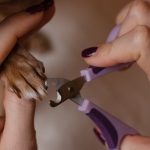Chances are, you’ve probably used the standard synthetic loofah or even a natural loofah to clean and scrub your body while in the shower. But it might be time to trade it in for a new alternative — preferably one that doesn’t harbor loads of bacteria, according to dermatologists.
Although loofahs can help gently exfoliate your skin and provide a rich lather when paired with your body wash, there are some underlying risks. “In general, loofahs are not necessary to use in the shower and may come with associated risks [like] microtraumas on the skin and, if not properly cared for or replaced, can lead to the risk of mold or bacteria,” says Dr. Marisa Garshick, a board-certified dermatologist at MDCS Dermatology: Medical Dermatology & Cosmetic Surgery.
To help you decide which exfoliating and cleansing products to use instead, we spoke to board-certified dermatologists about safer alternatives.
What can you use instead of a loofah?
Deciding which product to use in the shower is based on your personal preference. However, there are some factors that our experts recommend considering, like your skin type and how easy each product is to clean.
Hands
Most dermatologists recommend simply using your hands to lather your body wash and exfoliate because it’s hygienic and isn’t as likely to cause injury to the skin, according to Westbay.
“Using clean hands to wash your body is the most affordable, accessible and gentle option to wash the body,” says Garshick. “To get the benefits of exfoliation, it is possible to use an exfoliating cleanser.”
If you want to up your exfoliating game, consider using a body wash with chemical exfoliants like gentle alpha hydroxy acids, or a physical exfoliant like a scrub and apply it gently with your hands, says Westbay.
Silicone scrubs
Silicone scrubs are gentle enough for sensitive skin and are ideal for cleansing without being harsh or abrasive, according to Garshick. This type of bath product is durable and doesn’t trap bacteria or mold, making it more hygienic and easier to clean. Since it doesn’t harbor bacteria, it’s especially good for those with dry or sensitive skin, says Garshick.
Washcloths
If you have sensitive skin, consider using a washcloth since it cleans the skin without being too harsh or abrasive, according to Garshick. “A washcloth can help apply the body wash to the skin,” says Garshick. However, it’s best to avoid combining an exfoliating wash or scrub with a washcloth because it may be too rough for the skin, she says.
Like loofahs, washcloths can still harbor bacteria, though they tend to be easier to clean, says Garshick. You should clean your washcloths regularly (two to three times a week or after each use if visibly dirty) and should be thrown out after some time. If you maintain and clean your washcloth frequently, they can last up to two years.
Exfoliating gloves
Exfoliating gloves may be more exfoliating compared to loofahs, especially on thickened, rough areas of skin like knees, elbows and feet, says Westbay. However, because they are rougher on the skin, exfoliating gloves can cause microtears, according to our experts.
In terms of how it compares hygienically, exfoliating gloves are reusable, easier to clean and accumulate less bacteria compared to loofahs, according to Westbay.
Dry brush
If you have oily skin, consider using a dry brush on your body since it can help remove any buildup of dead skin and unclog pores, according to our experts. However, keep in mind that a dry brush can be more abrasive on the skin when compared to loofahs, says Garshick.
“I would consider them, overall, to be a higher risk of micro injury to the skin but a lower risk of microbial contamination,” says Westbay. “A dry brush accumulates bacteria less easily than a loofah, but that is not to say that using one hygienically and following proper cleaning is not necessary.”
What to know about your loofah
If you do decide to continue using your loofah, here are a few things to remember, according to Garshick.
- Proper use and cleaning. In order to prevent microbial growth, it is essential to regularly clean and replace your loofah. The frequency will depend on the type of loofah — for example, a natural loofah (which refers to ones that are made up of natural fibers, which may be derived from the luffa aegyptiaca plant) should be replaced every three to four weeks, while your standard plastic one can last for up to three months.
- Don’t be rough with it. While it may be tempting to achieve a deep clean by using a rough exfoliating product like your loofah to get dead skin and dirt off, it’s best to be gentle when using it on your skin to avoid any micro tears or injury.
- Be aware of your skin type. Although loofahs may seem like a universal product suitable for all skin types, some individuals need to be extra cautious if they want to continue using one. Those with dry or sensitive skin should be especially cautious not to rub too vigorously or apply too much pressure to minimize any potential trauma to the skin.
- Check the material of your loofah. It is best to look for loofahs made of antimicrobial materials to reduce the potential of bacterial overgrowth. Consider antimicrobial options made of natural sea sponge or silicone material, according to our experts.



